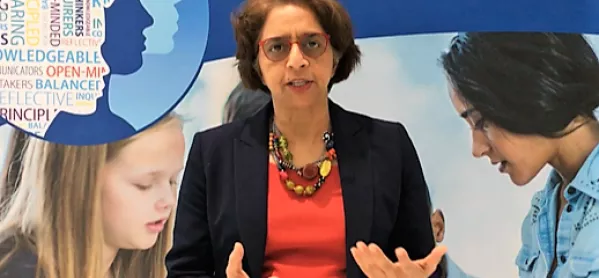“Why is there a teachers’ shortage in the first place?”
Siva Kumari, the director-general of the International Baccalaureate, doesn’t shy away from the difficult questions - and she wishes society didn’t either.
She speaks to Tes in the heavily air-conditioned premises of the Abu Dhabi National Exhibition Centre, where the IB has just held its first conference in the Middle East - a testament to the region’s growing importance for the international schools’ sector.
“We are growing here in the Middle East,” Kumari says. “It’s really a fortunate place for the IB to be in, because this kind of education is seen as important.”
News: How the IB is changing its theory of knowledge course
Read: IB ends exam registration fee in bid to widen access
Background: International Baccalaureate: what is it?
About 1,600 delegates, many of them teachers, mingled and attended professional development sessions, before the finale - a grandiose gala dinner in the palm-lined gardens of the Yas hotel.
Many politely comment on how hot it is outside, betraying their origins from very different climates.
But as far Kumari is concerned, their schools all need to be getting to grips with a common problem. She views teacher recruitment and retention as societal issues, and says there are a number of urgent questions that need to be asked.
The teacher recruitment crisis
“Is the profession inspiring teachers to stay in the field? Is it the profession that’s not rewarding any more? Are we treating them with respect? Are we paying them enough?” she asks.
“It is worrisome to me that society as a whole hasn’t stopped and thought about the teacher recruitment crisis. It seems like a very, very fundamental question to stop and ask. Policymakers, politicians and, frankly, every one of us needs to think about it.
“If there was a doctor shortage, we would stop and think about it because it’s a public health issue.”
The issue is especially urgent in Western societies, she comments, where mass education is a reality and a head-in-the-sand attitude about who is going to teach our children seems “really short-sighted”.
In its “small way”, the IB is financing 20 scholarships for teachers from Africa to take a master’s in education at online institution the University of the People.
The reason, she explains, is that if teachers paid for their own master’s degree, they would not get a return on investment on it because their salaries are not proportionally high enough to meet that investment.
Teachers ‘not at risk’
Having been in her role at the IB for five years, Kumari says she has seen many things change and a lot of thought is going into how education, and teaching, will change in the future.
“Now that machines are starting to think better than us, it’s going to become more important to stop and think about the role of humanity, of the human mind, of creativity, because those are things that machines can’t duplicate,” she says.
“A lot of thought needs to go into, ‘What does it mean to teach in this day and age when content is everywhere? What does teaching mean?’”
However, Kumari is positive that teachers will never be on the list of professionals that risk being replaced by AI.
“A lot of people say teachers will be out of business because we are all going to learn from machines,” she says. “But the role of the teacher, the connection the teacher develops in the classroom, is central. We want to focus on the profession, and the craft. For us, it’s really important. ”




